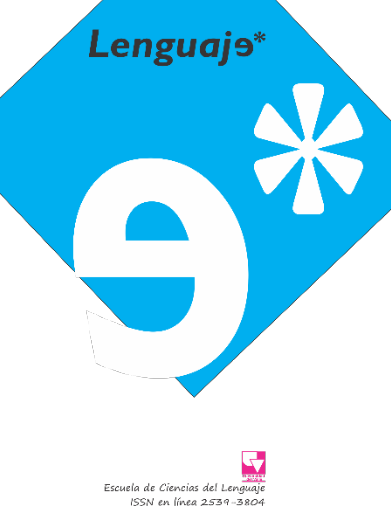El conocimiento situado del docente a través de la construcción de metáforas y de la validación de sus narrativas
Palabras clave:
Metáfora, Validación de narrativas, El conocimiento situado del docenteContenido principal del artículo
Este artículo teórico argumenta cómo el proceso de construcción y desarrollo de metáforas explica cómo los profesores sitúan su conocimiento y brindan sentido a su vida docente y a sus prácticas. No obstante, el proceso de construcción de metáforas debe ir más allá del alcance de las teorías cognitivas y de su sistematización de conceptos en las metáforas. Las metáforas como apuestas conscientes por situar el conocimiento docente deben ser consideradas como un texto cuyos elementos constitutivos son los valores, los sistemas de creencias, las ideologías, el conocimiento profesional y la cultura interrelacionados en las mentes de los docentes. El concepto de validación de narrativas juega un papel determinante en la ratificación de la definición y el desarrollo de metáforas que expliquen la construcción de conocimiento situado por parte del docente.
Aristotle (1941). The Basic Works of Aristotle. New York: Random House.
Bazerman, C. (1988). Shaping written knowledge: The genre and activity of the experimental article in science. Madison: University of Wisconsin Press.
Becker, H. S., Geer, B., Hughes, E. C., & Strauss, A. L. (1961). Boys in white: student culture in medical school. Chicago: The University of Chicago Press.
Burke, K. (1945). A Grammar of Motives. New York: Prentice-Hall.
Chandler, S. (1991). Metaphor Comprehension: A Connectionist Approach to Implications for the Mental Lexicon. Metaphor and Symbolic Activity, 6(4), 227-258.
Clandinin, D. J., & Connelly, F. M. (1996). Teachers’ Professional Knowledge Landscapes: Teacher Stories––Stories of Teachers––School Stories––Stories
of Schools. Educational Researcher, 25(3), 24–30.
Cortazzi, M, & Lixian, J. (1999). Bridges to learning: Metaphors of teaching, learning and language. In L. Cameron & G. Low (Eds.), Researching and Applying Metaphor (pp. 149-176). Cambridge: Cambridge University Press.
Edge, J. (1992). Cooperative Development. Essex: Longman.
Eubanks, P. (1999). The Story of Conceptual Metaphor: What Motivates Metaphoric
Mappings? Poetics Today, 20(3), 419-442.
Freeman, D. (1992). Collaboration: constructing shared understandings in a second
language classroom. In D. Nunan (Ed.), Collaborative Language Learning and Teaching (pp. 56-80). Cambridge: Cambridge University Press.
Freeman, D. (1996). Renaming experience/reconstructing practice: Developing new understandings of teaching. In D. Freeman & J. C. Richards (Eds.), Teacher Learning in Language Teaching (pp. 221-241). Cambridge: Cambridge University Press.
Freeman, D. (1998). Doing Teacher Research: From Inquiry to Understanding. Boston: Heinle & Heinle Publishers.
Gadamer, H.-G. (1989). Truth and Method (2nd ed.). New York: Continuum.
Gentner, D. (1989). The mechanisms of analogical learning. In S. Vosniadou & A. Ortony (Eds.), Similarity and Analogical Reasoning (pp. 199-241). Cambridge: Cambridge University Press.
Gibbs, R. W. Jr. (1992). When Is Metaphor? The Idea of Understanding in Theories of Metaphor. Poetics Today, 13(4), 575-606.
Golombek, P. R., & Johnson, K. E. (2017). Re-conceptualizing Teachers’ Narrative Inquiry as Professional Development. PROFILE: Issues in Teachers’ Professional Development, 19(2), 15-28. doi: http://dx.doi.org/10.15446/profile.v19n2.65692
Herndon, L. D. (2002). Putting theory into practice: Letting my students learn to read. In K. E. Johnson & P. R. Golombek (Eds.), Teachers’ Narrative Inquiry as Professional Development (pp. 35-51). New York: Cambridge University Press.
Holyoak, K., & Thagard, P. (1989). Analogical Mapping by Constraint Satisfaction. Cognitive Science, 13, 295-355.
Johnson, K. E. (1999). Understanding Language Teaching: Reasoning in Action. Boston: Heinle & Heinle Publishers.
Johnson, K. E. (2006). The Sociocultural Turn and its Challenges for Second Language Teacher Education. TESOL Quarterly, 40(1), 235-257. doi: 10.2307/40264518
Johnson, K. E (2009). Second Language Teacher Education: A Sociocultural Perspective. New York: Routledge.
Johnson, K. E., & Golombek, P. R. (Eds.). (2002). Teachers’ Narrative Inquiry as Professional Development. New York: Cambridge University Press.
Johnson Sheehan, R. D. (1999). Metaphor as Hermeneutic. Rhetoric Society Quarterly, 29(2), 47-64.
Kramsch, C. (Ed.). (2002). Language Acquisition and Language Socialization: Ecological Perspectives. New York: Continuum.
Middleton, D. (2010). Putting the Learning into e-learning. European Political Science, 9(1), 5-12.
Munby, H., & Russell, T. (1990). Metaphor in the Study of Teachers' Professional Knowledge. Theory into Practice, 29(2), 116-121.
Paavola, S., & Hakkarainen, K. (2005). The Knowledge Creation Metaphor – An Emergent Epistemological Approach to Learning. Science & Education, 14(6), 535-557.
Papin, L. (1992). This Is Not a Universe: Metaphor, Language, and Representation. Modern Language Association, 107(5), 1253-1265.
Patchen, T., & Crawford, T. (2011). From Gardeners to Tour Guides: The Epistemological Struggle Revealed in Teacher-Generated Metaphors of Teaching. Journal of Teacher Education, 62(3), 286-298.
Philpott, C. (2013). How is teacher knowledge shaped by the professional knowledge context? Minding our metaphors. Journal of Curriculum Studies, 45(4), 462-480.
Sfard, A. (1998). On Two Metaphors for Learning and the Dangers of Choosing Just One. Educational Researcher, 27(2), 4-13.
Swales, J. M. (1990). Genre Analysis: English in academic and research settings. Cambridge: Cambridge University Press.
Thomson, M. M. (2015). Metaphorical images of schooling: beliefs about teaching and learning among prospective teachers from the United States displaying different motivational profiles. Educational Psychology, 36(3), 502-525. doi: 10.1080/01443410.2015.1024612
Tudor, I. (2001). The Dynamics of the Language Classroom. Cambridge: Cambridge University Press.
Wegner, E., & Nückles, M. (2015). Knowledge acquisition or participation in communities of practice? Academics’ metaphors of teaching and learning at the university. Studies in Higher Education, 40(4), 624-643. doi: 10.1080/03075079.2013.84221
Wenger, E. (1998). Communities of Practice: Learning as a Social System. Systems Thinker, 9 (5), 1-10.
Wertsch, J. V. (2002) Voices of Collective Remembering. Cambridge: Cambridge University Press.
Woodward, T. (1991). Models and Metaphors in Language Teacher Training: Loop input and other strategies. Cambridge: Cambridge University Press.

